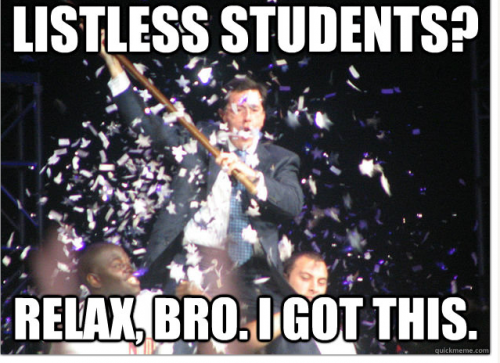
Image Credit:
Photo by Webrageous, Captions by Aaron Mercier
When I decided to make my rhetoric and writing course about “truthiness” as Stephen Colbert defines it—something that “feels true,” without needing to rely on pesky facts—I thought I knew what I wanted to do with it. I wanted to be in a networked computer classroom, to break down the barriers between the classroom and the homework. I wanted a course blog so students could practice writing in a variety of modes, and have the chance to see what their classmates were doing and thinking, and to establish more connections between classroom and individual learning.
I wanted the course readings to be timely, to be engaged with the issues of the week, so students would start to develop a sense of urgency around the skills I was teaching. I wanted to focus heavily on research and reading skills, and use the resources of the university and the web at large in conversational real time. No more blank silences when I ask a question, I wanted to hear the gentle rattle-and-click of focused research being carried out on all those fancy computers; I wanted to harry my students into developing a habitual curiosity as a result of unfamiliarity.
And it’s overall going pretty great. My students, more than any other group I’ve taught, are asking serious, thoughtful questions about not only the work that they’re doing in here but the world at large. They’re engaged at a theoretical and intellectual-historical level with many of the most challenging readings I’m assigning, from media theory to political science to...well, okay. De Certeau was not a hit. But conversations in class are energetic and productive. I see students taking notes on what their peers are saying. There’s chatting before and after class.
That’s a bunch of the good stuff that’s happening. But in the middle of all this rapturous success, I got the first major writing assignment back. Now, I had been teaching from Everything's an Argument, giving a fair amount of class time to the basic concepts: what is rhetorical analysis, what are the goals of doing it, who are the players in a given rhetorical exchange and how do we talk about persuasive tactics, their deployment by authors and their reception by audiences. It was immediately apparent, however, that something hadn’t clicked. I found myself writing “topical” in too many margins. In all the margins, really. Nearly all my students seemed to think that the goal was to create a report on an issue, rather than an account of a controversy.
See, I taught some lessons on rhetoric and analysis, but my idea going into the course, the idea that gave me all those goals that led to everybody having fun, is that you need to have something to say before you can write well. I still think that. But I’m learning to adjust the balance a little. In the middle of grading that first batch of papers, I assigned a blog post, asking my students to self-report their progress in the course so far and then to talk about what in the course had been most and least productive for them. The blog and De Certeau were the big losers. Class conversations and clips of Colbert were the big winners. Well, okay. That’s the student take.
Meanwhile, back in the Land of Always Grading, my take was that the goals of analysis were not clear. Audience and how to talk about it was still a hazy concept. What to do with ideas like ethos, pathos, logos, etc. was kind of a mystery to half the class. People were writing analytical summaries that were somewhere between a checklist of rhetoric class jargon and a paraphrase of their source. Ironies were missed, arguments flattened. I’m a pretty efficient grader but I was spending a half-hour per 7-page paper, even while consciously hurrying.
So the day after I finished that round of assignments, the reading was the Logos chapter from Everything is an Argument. I went through the usual rigamarole—“logos isn’t information, but refers to ways of using information persuasively”—and wasn’t getting much from them. Well, in situations like that, it’s nice to have an escape hatch more productive than “class dismissed” so I usually have a germaine youtube clip or two in mind. Stephen Colbert had interviewed Jim Garlow, a pastor leading the charge on the Pulpit Freedom Sunday movement. We watched a 3 minute clip and I asked “well what do you think” and they were off and running. All I had to do, was steer things away from the topical and into the analytical. Students were taking notes from each other again. We ran out of time so I assigned the whole segment that I took the clip from as reading for the next class, and set some guidelines about how to watch it. My entire lesson for that Thursday basically consisted of crowdsourcing an analytical summary. I’ll be posting that plan in the Lesson Plans section, but as a teaser on the results, less than a week on, every interaction I’ve had with a student I’ve seen them consciously, and quite productively reformulating their understanding of the course, its jargon, my goals, and their goals as a reader and writer.
What I learned from this is that you can’t chicken-and-egg the hard questions about teaching writing. You have to assume that the chicken and the egg coalesced in a moment of autochthnous primal simultanaeity and if they did it, so can you. In other words, what I’m learning this semester is the balance between teaching theory and teaching practice, between content and form, global and local, between facilitating conversations and intervening in them. I also learned that sometimes, when a conversation isn’t going well, saying “screw it” and showing them a funny video is the best thing you can possibly do.

